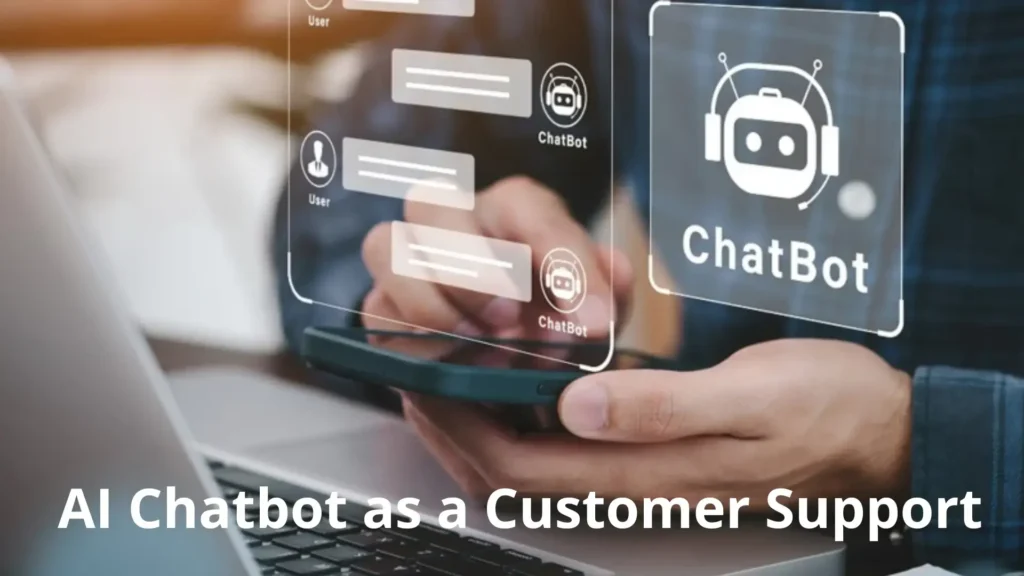Say goodbye to long queues—adopt AI-powered customer service!
Let us say clients visit your website in need of urgent support. They ask a simple query, but rather than receiving a prompt response, they are confronted with lengthy wait times, a support staff that is overworked, or worse, an annoying email exchange. Customers expect seamless, quick, and effective help in today’s fast-paced digital world. An AI chatbot for customer support becomes crucial in this situation.
Businesses may automate responses, expedite help, and guarantee that consumers receive answers in a matter of seconds by implementing AI-powered customer service. Beyond automation, though, employing a chatbot as a gatekeeper guarantees that your customer support staff is not overloaded with routine questions, increasing productivity and client happiness.
What is an AI Chatbot for customer support?
A virtual assistant that employs artificial intelligence to interact with consumers, respond to frequently asked queries, and escalate complicated problems as needed is known as an AI chatbot for customer support. Artificial intelligence (AI)–powered chatbots use natural language processing (NLP) and machine learning to comprehend purpose, context, and user behavior, which makes conversations feel more human-like than traditional chatbots that rely on scripted responses.
According to Gartner research, more than 25% of companies will use chatbots as their main customer care channel by 2027. AI-powered chatbots are becoming essential due to the increasing demand for immediate responses.
Why an AI chatbot ought to be the gatekeeper to your client service?
An AI chatbot serves as a gatekeeper, screening and answering basic consumer questions before elevating more complicated ones, rather than forwarding all client inquiries to live representatives. Businesses gain from this methodical approach in three main ways:
- Faster Response Times: Rather than standing in lengthy lines, customers receive prompt responses.
- Enhanced Support Workflow: Agents are more efficient when they only respond to high-value inquiries.
- Cost Savings: While expanding customer service, automating responses lowers labor expenses.
According to an IBM study, AI chatbots can respond to up to 80% of standard customer questions, significantly lowering operating expenses while raising customer satisfaction.
What is the one-door strategy?
According to the one-door concept, all consumer contacts begin with an AI-powered chatbot before being routed to live chat, email, or other support channels. Rather than clients contacting you via disparate channels and encountering irregularities, this approach guarantees:
- A consolidated approach to customer service
- Reliable, excellent support
- Effective routing to the appropriate division
Businesses that have adopted this strategy have seen an improvement in response times and a 40% decrease in agent workload.
The benefits of a one-door strategy
Companies using artificial intelligence chatbots as gatekeepers:
- Decreased support expenses through the automation of routine inquiries
- Improved client satisfaction through quicker resolution times
- Increased productivity of agents as human representatives concentrate on more intricate jobs
- Smooth data gathering, enhancing analytics and customization
Reduce support expenses and increase productivity by automating your customer service with HeyEve.ai!
How a one-door strategy benefits customers and Support Agents
An AI-powered customer support chatbot offers consumers the following benefits:
- Round-the-clock availability for prompt responses
- Elimination of annoying ticketing systems and lengthy wait times
- Tailored assistance based on prior exchanges
For agents, it means:
- Spending less time asking the same questions.
- Increased attention to intricate, valuable relationships
- Decreased fatigue and increased productivity
AI chatbots are a perfect first point of contact because 69% of customers prefer self-service choices, according to Salesforce.
What does a front-door chatbot mean for email or phone support?
By using an AI chatbot as a gatekeeper, companies may cut down on pointless phone calls and emails. AI chatbots, as opposed to agents who handle each inquiry by hand,
- Quickly fix basic problems (password resets, order tracking, FAQs)
- Before elevating a problem, gather relevant facts.
- Make that omnichannel assistance runs smoothly and points clients to the appropriate platform.
Suggested Read: https://heyeve.ai/blogs/ai-in-marketing-and-sales/
Benefits of using an AI-Powered Customer Service Chatbot
There are many benefits to using an AI chatbot for customer support, including:
1. Gives customers instant answers 24/7
Never let clients wait. Even outside of regular business hours, chatbots offer prompt service.
2. Reduces costs and scales support
Automating replies helps businesses save an average of 30% on support expenses (Juniper Research).
3. Reducing service time effectively
By answering common questions, AI chatbots can cut down on resolution times by as much as 50%.
4. Data collection
Every conversation is recorded, which aids companies in comprehending the needs of their clients.
5. Increases agent efficiency
Agents can concentrate on high-priority situations by using AI to filter repetitive queries.
6. Self-service
Self-service is preferred by more than 67% of customers over chatting with a human (Zendesk).
7. Enhances personalization with customer context
AI provides personalized responses by remembering previous exchanges.
8. Improves CX
Higher satisfaction results from quicker, more accurate responses.
9. Allows you to offer omnichannel support
AI chatbots ensure smooth communication by integrating with websites, social media, WhatsApp, and SMS.
What are the features customer service chatbots should have?
Look for the following when selecting an AI chatbot for customer support:
- NLP (natural language processing) for precise answers
- Helpdesk and CRM integration for smooth support
- Responses that can be altered to maintain brand consistency
- Capabilities across several channels (Website, WhatsApp, Messenger, Email, etc.)
- Analytics and reporting to monitor the efficacy of chatbots
Chatbots for customer service comparison chart
| Chatbot Name | Best For | Key Features | Pricing |
| Zendesk | Automation of enterprise support | CRM connectivity, omnichannel support, and AI-powered processes | Begins at $49 per month. |
| Hubspot | Teams in charge of marketing and sales | Lead nurturing, conversational AI, and smooth CRM synchronization | Both paid and free plans |
| Zoho SalesIQ | Creating leads and providing customer support | Lead scoring, live chat, and chatbot automation | $10 per month is the starting price. |
| Netomi | AI skills for deep learning | Multilingual help, intelligent replies, and predictive AI | Personalized prices |
| Intercom Fin | Real-time interaction with customers | Customer journey insights, real-time AI conversation, and interaction with popular platforms | Begins at $39 per month. |
| Ada | No-code business chatbot | Conversational AI, linguistic support, and a drag-and-drop constructor | Begins at $399 per month. |
| Certainly | Automation of e-commerce | NLP-based automation, product recommendations, and e-commerce customization | Personalized prices |
| Dixa | AI-driven customer support | Automation, omnichannel support, and AI ticketing | Begins at $95 per month. |
| Zowie | Automating self-service and FAQs | Self-learning system, AI-powered FAQ automation, and multilingual | $62 per month is the starting price. |
| Meya | Incredibly adaptable chatbot | Chatbot analytics, API interfaces, and an adaptable AI framework | Personalized prices |
The 10 Best AI Chatbots for Customer Support
1. Zendesk– Best for Enterprise Support Automation
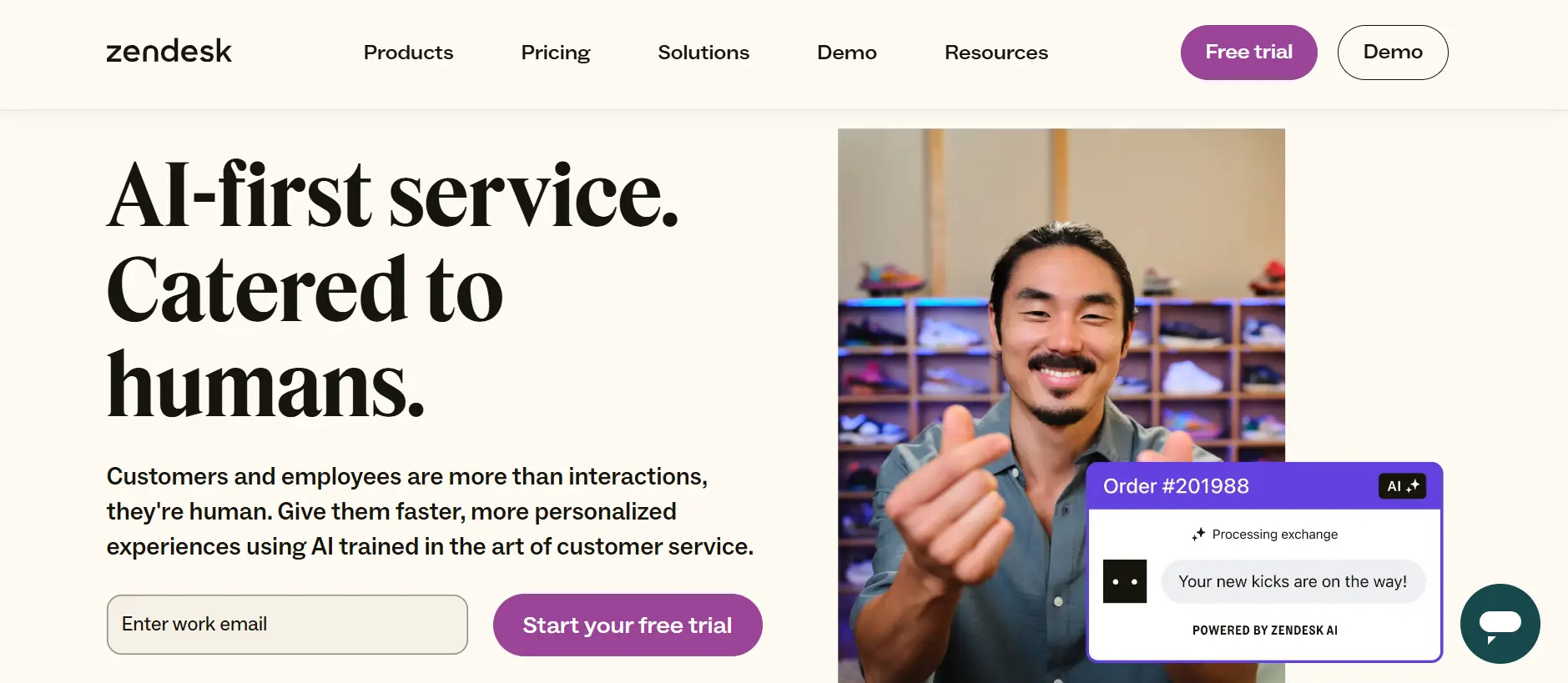
By automating processes, answering frequently asked questions, and seamlessly integrating with helpdesk and CRM software, Zendesk’s AI chatbot simplifies enterprise customer support. It guarantees a consistent experience across platforms by offering omnichannel support.
2. HubSpot – Ideal for Marketing and Sales Teams
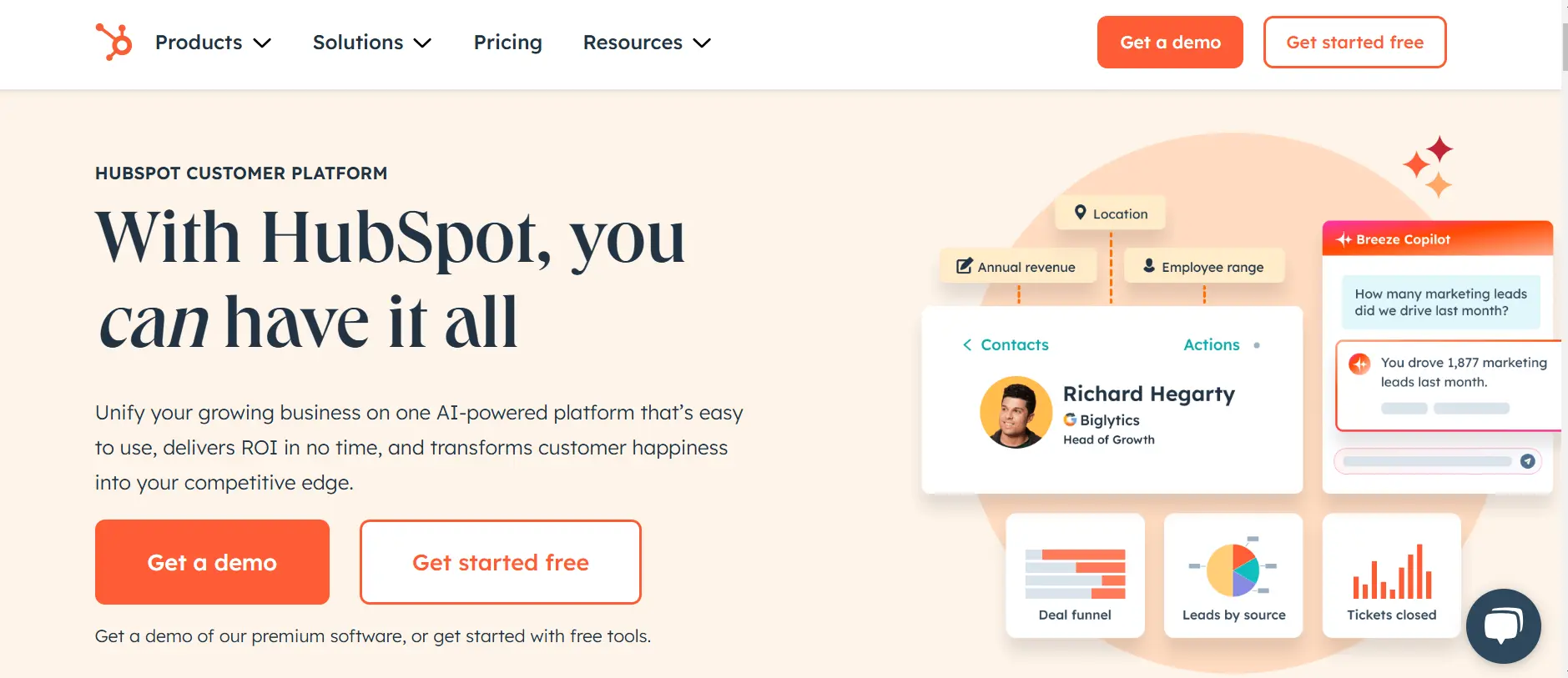
Businesses can create leads, nurture prospects, and automate conversations across marketing and sales funnels with the help of HubSpot’s AI-powered chatbot. It enhances client engagement by personalizing responses with an integrated CRM connection.
3. Zoho SalesIQ– Great for Lead Generation & Customer Service
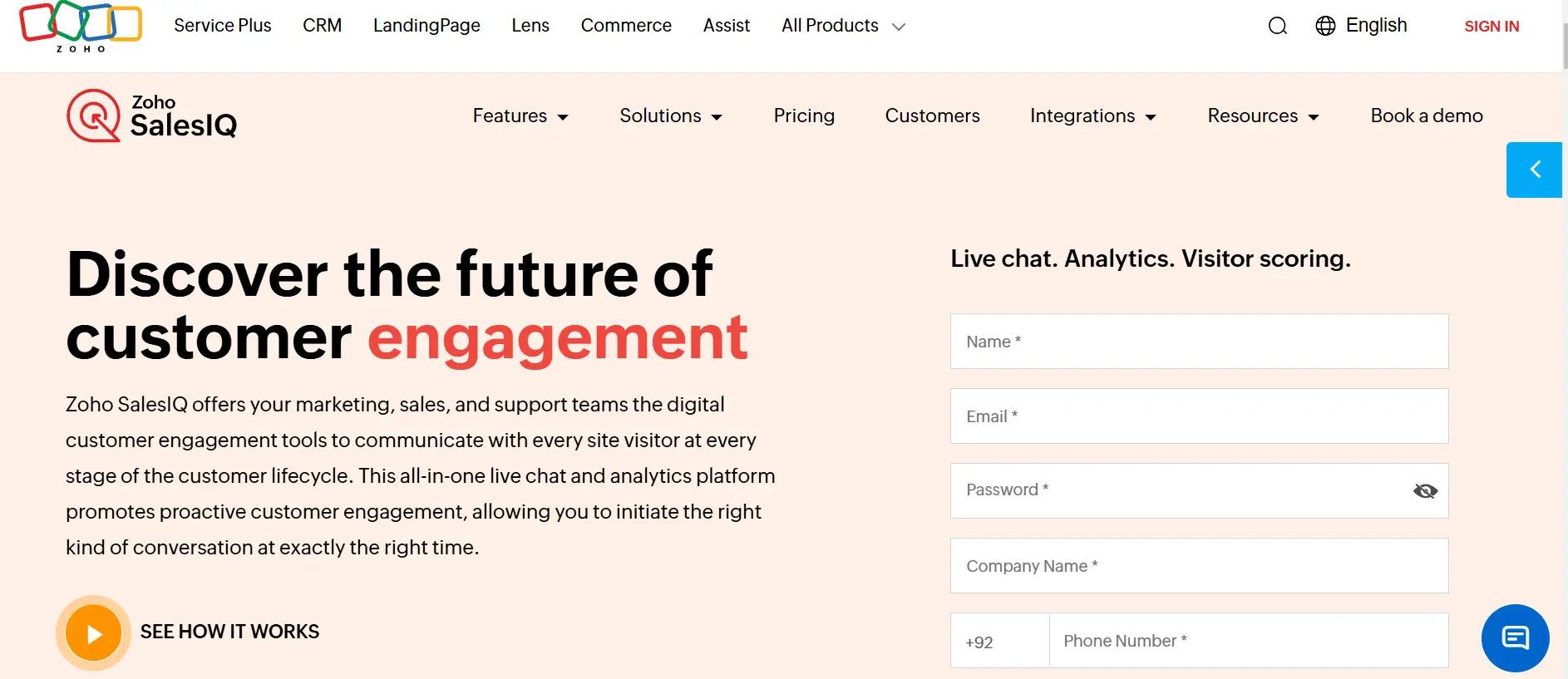
Zoho SalesIQ helps businesses generate leads, qualify prospects, and offer real-time customer support by fusing live chat with AI-driven automation. Because of its seamless integration with Zoho CRM, it is a fantastic option for companies that prioritize sales.
4. Netomi– AI Chatbot with Deep Learning Capabilities
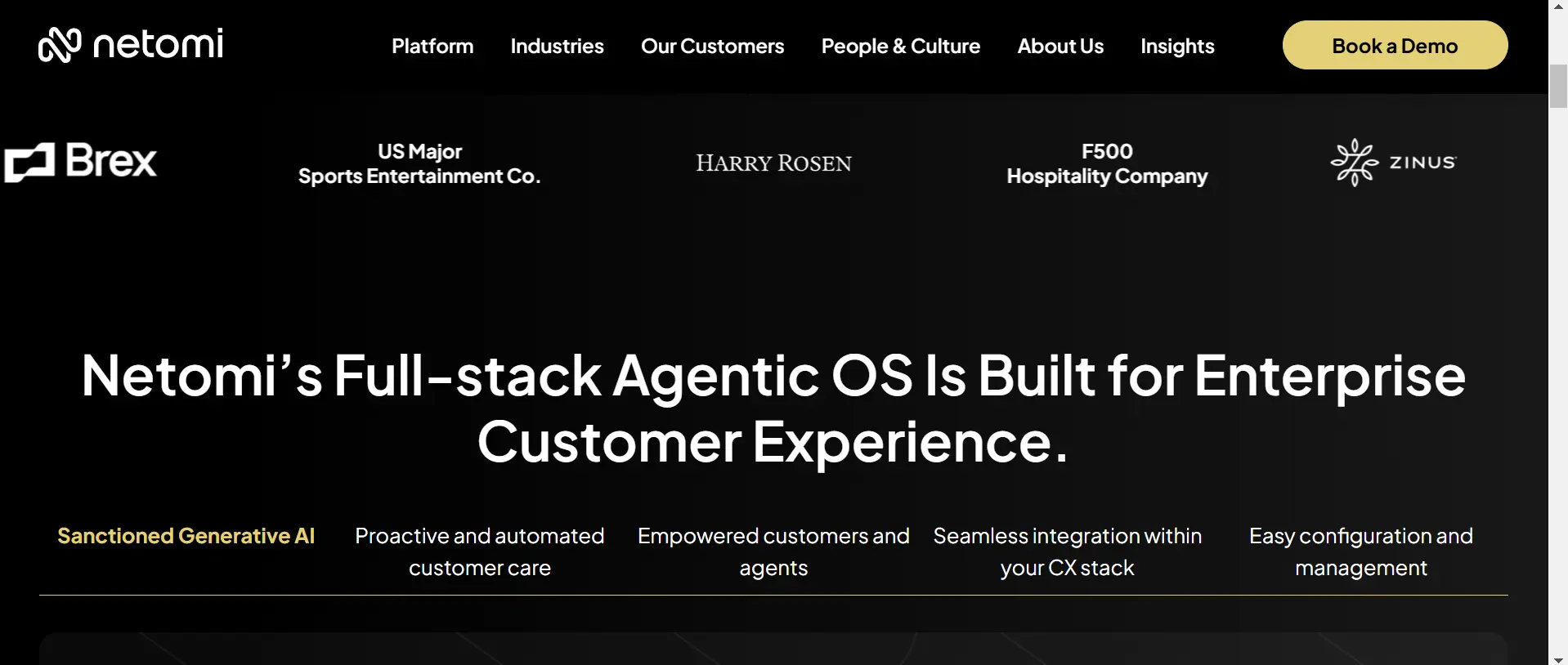
Netomi uses deep learning and sophisticated AI to automatically answer up to 80% of consumer questions. It proactively responds to consumer concerns and escalates issues only when required thanks to predictive AI capabilities.
5. Intercom Fin– Real-Time AI Chatbot for Customer Engagement
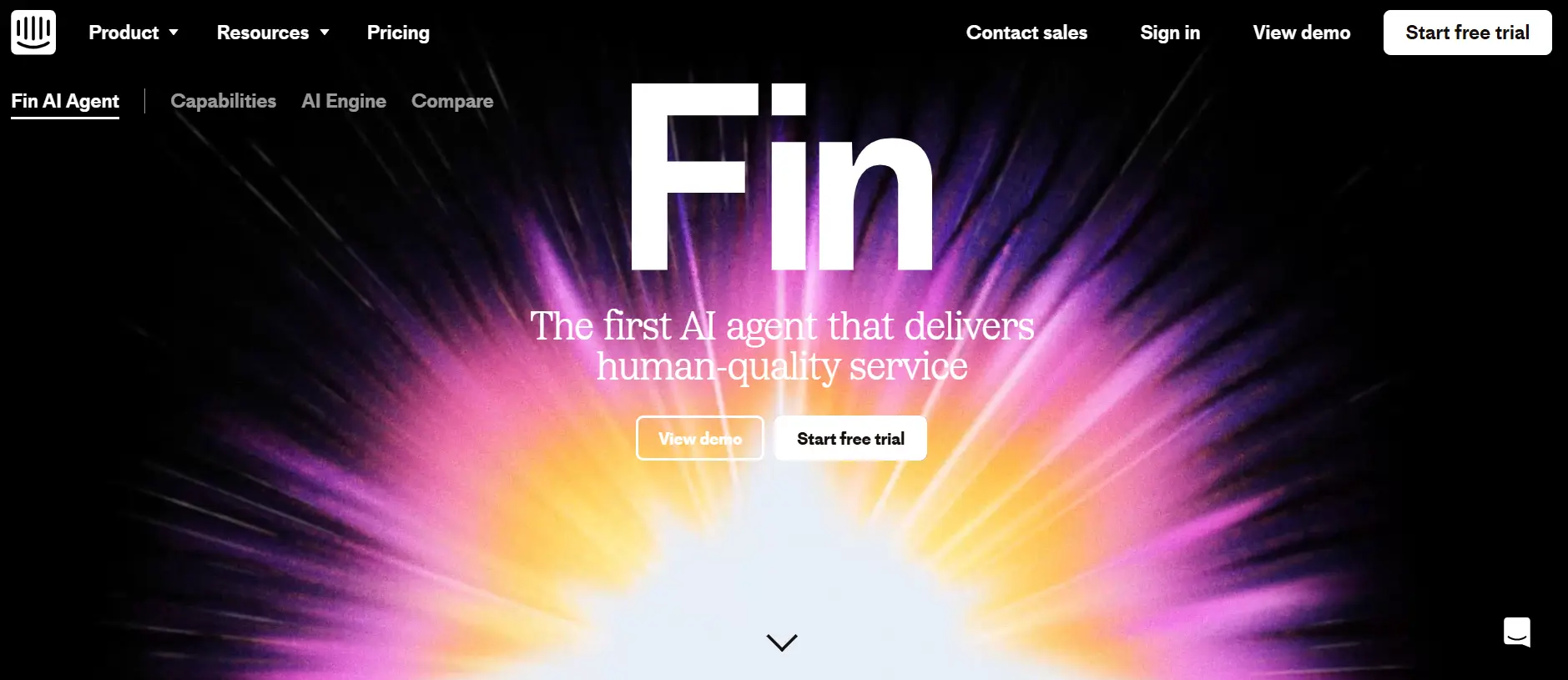
Using AI to guide clients, offer solutions, and automate intricate processes, Intercom Fin focuses on real-time talks. It is excellent at integrating with business tools and tailoring interactions with customers.
6. Ada– No-Code Chatbot for Businesses of All Sizes
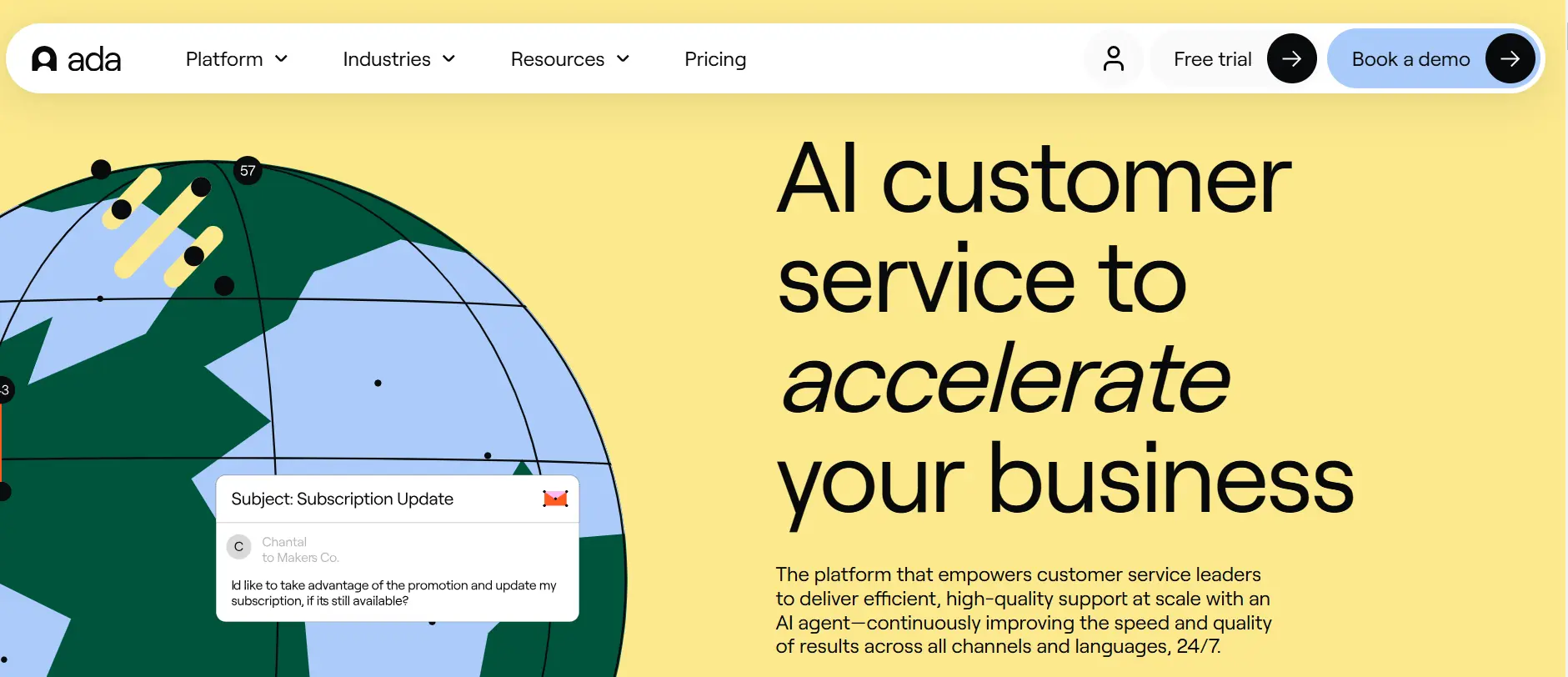
Ada provides a no-code AI chatbot that lets companies automate sales queries, customer service, and frequently asked questions without requiring a developer. It interacts with popular helpdesks and CRMs and offers multilingual responses.
7. Certainly– Best for eCommerce Automation
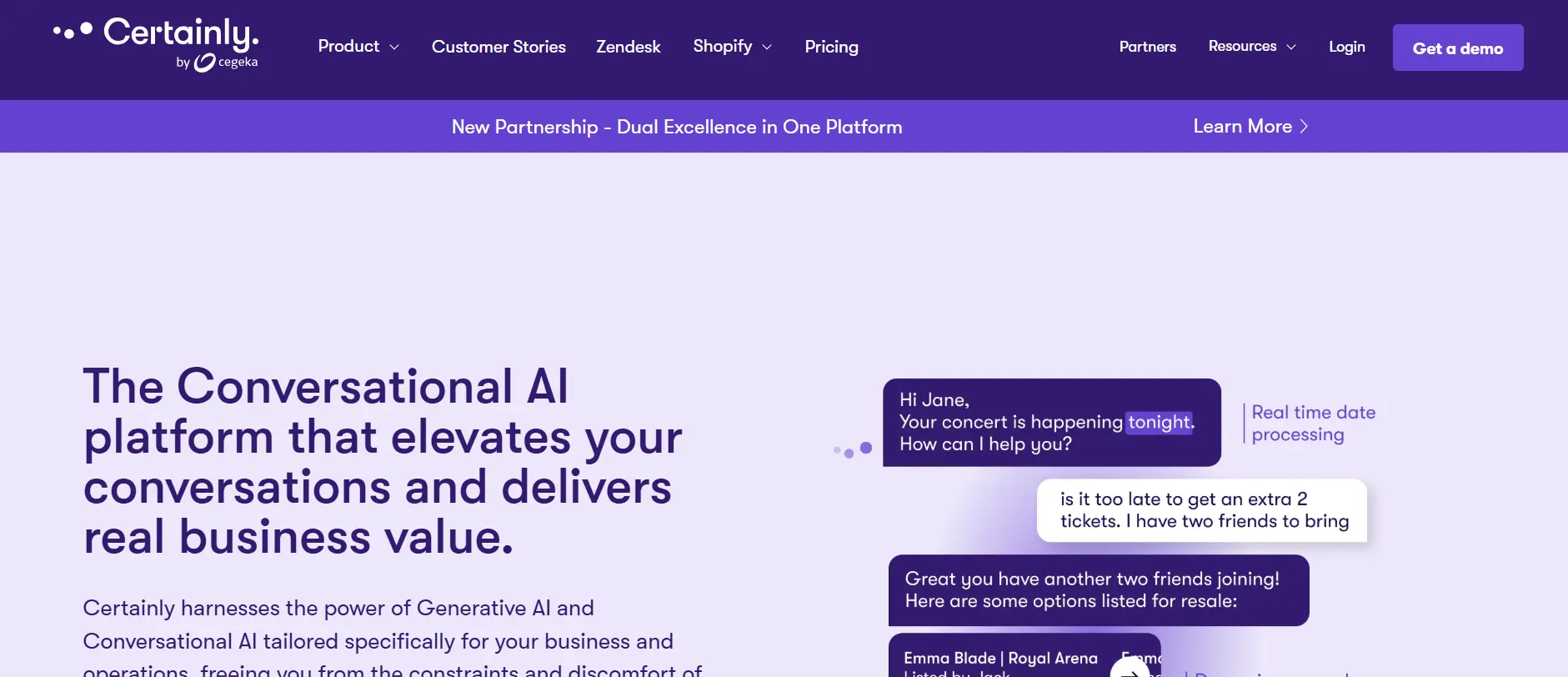
Automates order tracking, cart recovery discussions, and product recommendations for eCommerce companies. By decreasing abandoned carts and increasing conversions, Certainly AI-powered chatbot improves the shopping experience.
8. Dixa– AI-Powered Customer Service Solution
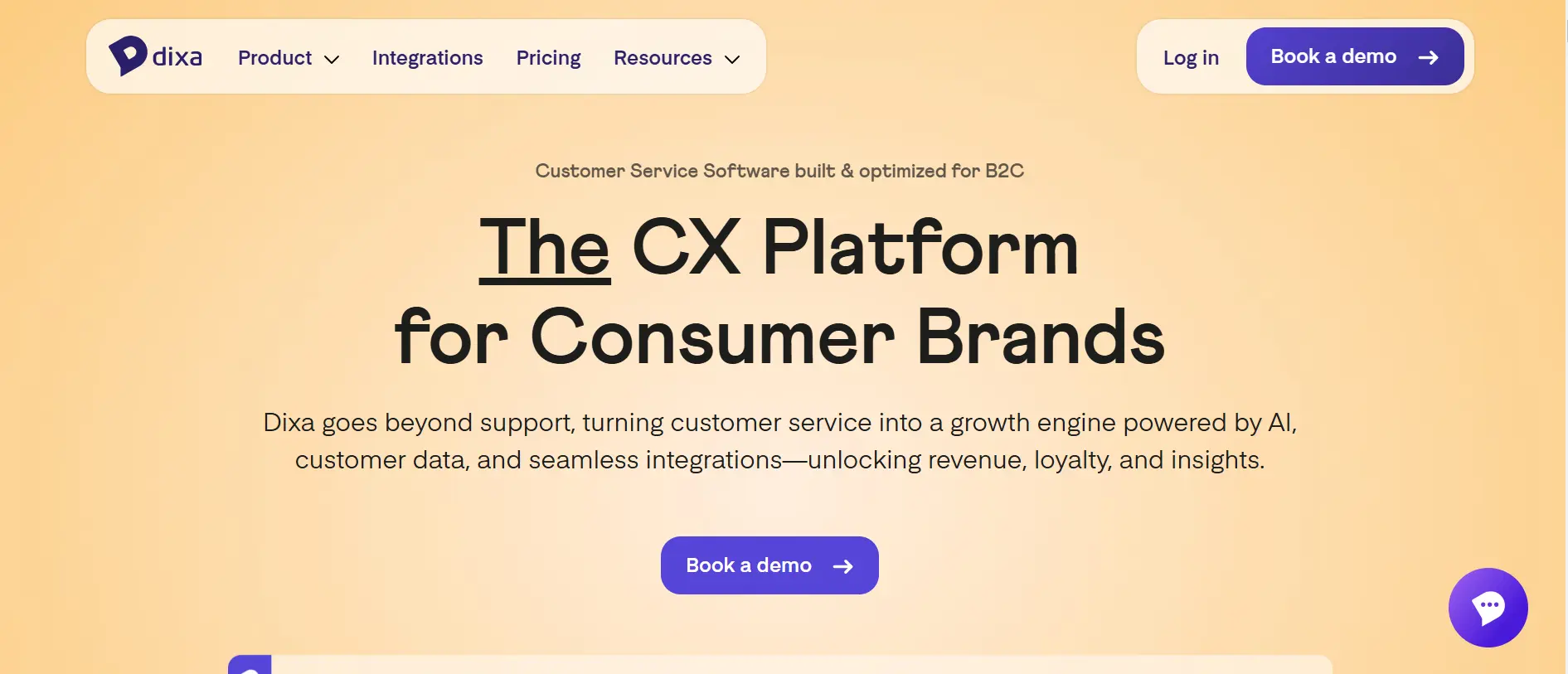
By automating live chat, knowledge base queries, and ticketing, Dixa’s AI chatbot increases customer support efficiency. Because it provides omnichannel support, it is a great option for mid-to-large organizations.
9. Zowie– Chatbot for Automating FAQs and Self-Service
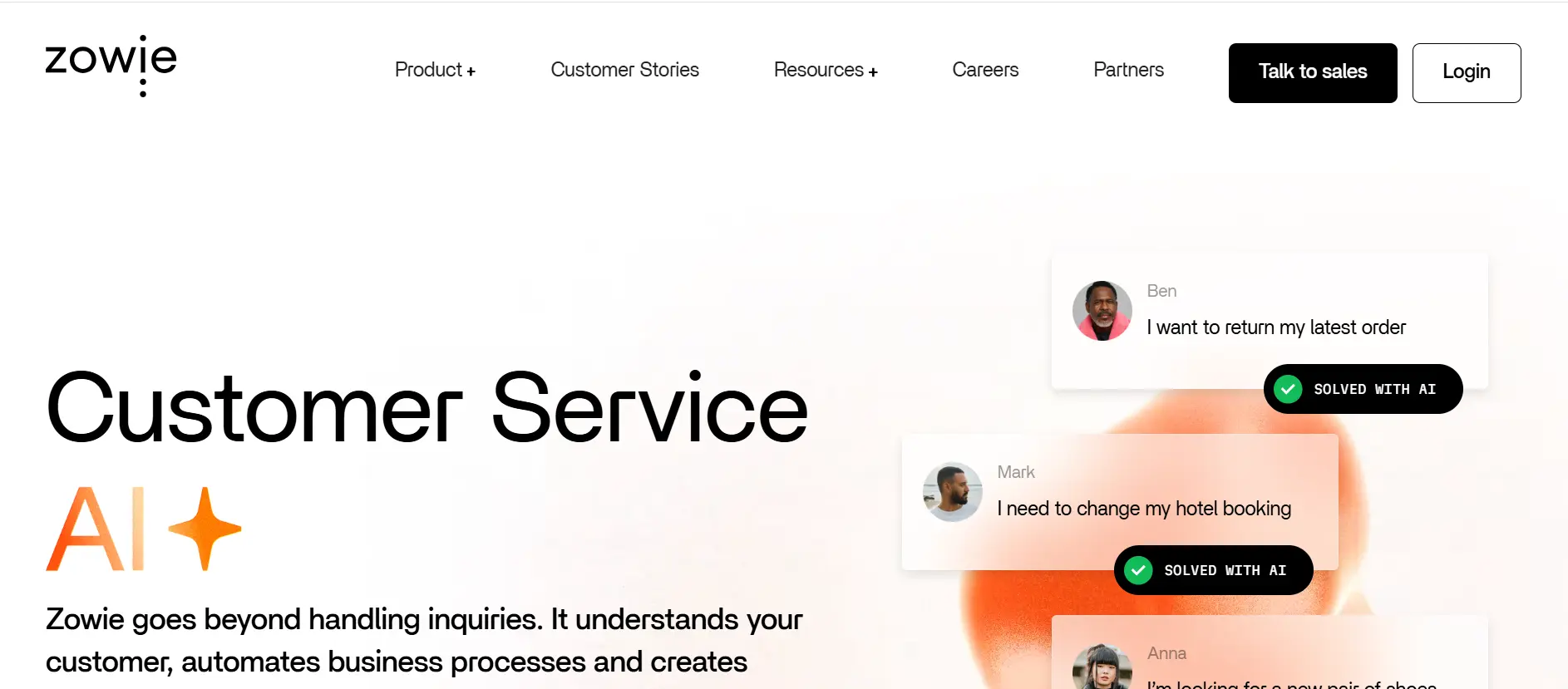
Zowie is made to manage large amounts of frequently asked questions and enhance self-service by providing immediate, AI-powered responses. It provides scalable automation for client interactions while lowering agent workload.
10. Meya– Highly Customizable AI Chatbot
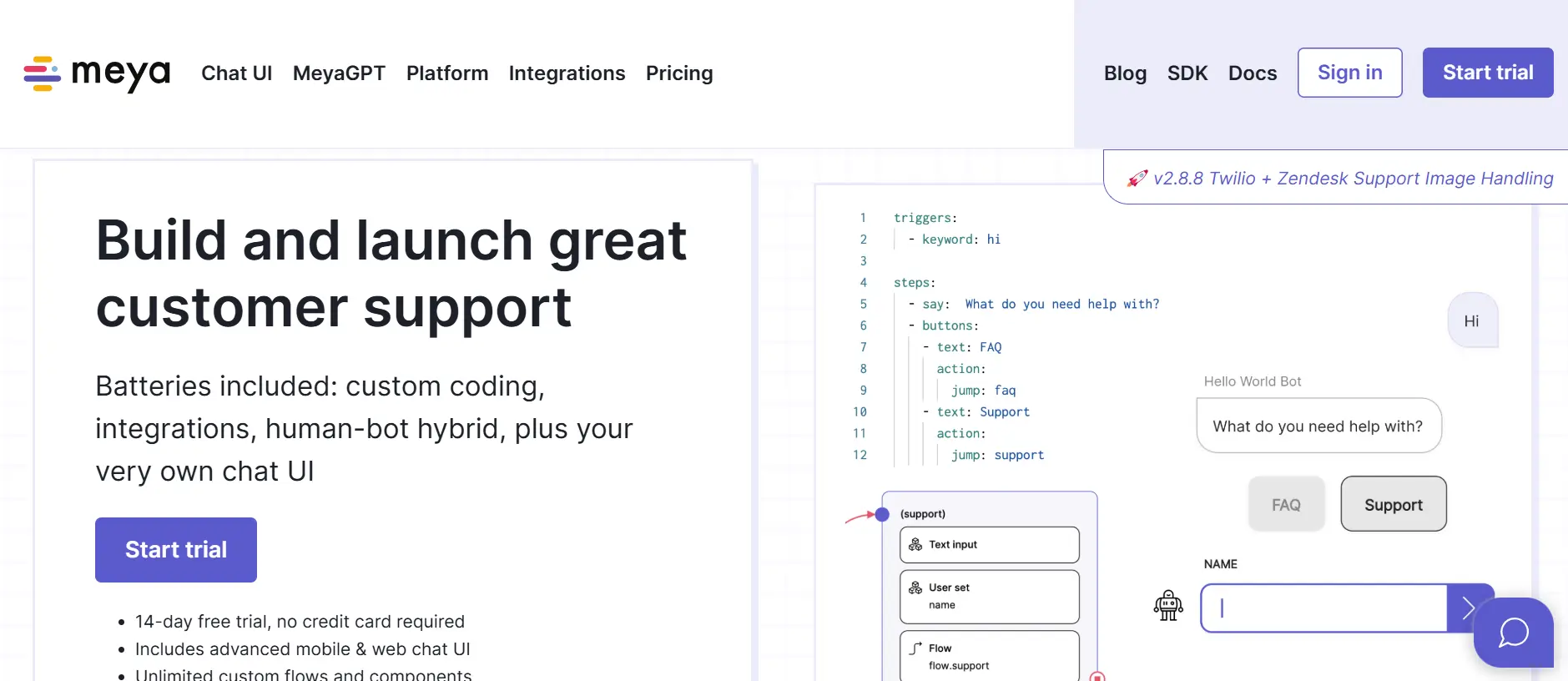
Meya is a developer-friendly chatbot platform that provides extensive customization through AI workflows, API connectors, and flexible bot-building. For companies seeking a customized AI chatbot solution with sophisticated features, it is ideal.
Examples of companies using AI Customer Service Chatbots
Numerous businesses have effectively used AI chatbots for customer service, demonstrating their ability to enhance customer satisfaction while cutting expenses and boosting productivity.
1. Photobucket: 24/7 support
An AI-powered customer support chatbot was deployed by Photobucket, a well-known picture hosting and sharing website, to offer prompt answers to user questions. They made sure their consumers could get help whenever they needed it by employing automation, which drastically decreased the need for human intervention.
Results:
- Using automated solutions reduced response times by 60% and increased availability around the clock.
- Improved client satisfaction through prompt problem-solving
2. Grove Collaborative: AI-powered self-service
An AI chatbot was incorporated as a gatekeeper by Grove Collaborative, a sustainable home basics company, to assist clients with orders, tracking, and commonly asked issues. They used artificial intelligence to optimize their assistance system rather than depending entirely on human personnel.
Results:
- The outcome was a 40% decrease in agent workload.
- A better experience with self-service
- Increased effectiveness in responding to routine inquiries
3. Hello Sugar: Cost savings
AI chatbots were used by Hello Sugar, a beauty and personal care company, to lower operating expenses and expedite customer support. Their chatbot took care of appointment scheduling, booking questions, and frequently asked questions, freeing up professionals to work on more intricate client requirements.
Results:
- The outcome was a 35% reduction in customer service expenses.
- Enhanced effectiveness in scheduling and booking
- Improved customer retention through quicker query resolution
How to choose the right AI Chatbot for Customer Support
1. Consider your business goals
Is a chatbot required for customer assistance, lead creation, or self-service?
2. Ensure it integrates with your key systems
Verify that it works with your messaging, support desk, and CRM systems.
3. Confirm it’s easy to set up and purpose-built
Choose a chatbot that is easy to use and does not need a lot of coding knowledge.
4. Assess the channels it can deploy on
For smooth omnichannel assistance, make sure it works with social media, mobile, and web platforms.
Your clients can anticipate prompt responses. Allow HeyEve.ai to do the work.
Final Thoughts!
AI-powered chatbots for customer care give businesses a competitive edge by providing round-the-clock, immediate assistance, cutting expenses, and enhancing customer satisfaction. You may improve agent productivity, streamline processes, and give clients prompt, precise answers by using an AI chatbot as a gatekeeper.
AI chatbots are not simply a trend; they are the way of the future for customer service at a time when efficiency and quickness determine consumer pleasure.
Frequently asked questions(FAQs)
What is the role of AI chatbots in customer service?
AI chatbots increase productivity by answering consumer questions, automating answers, and elevating complicated problems.
How do AI chatbots improve customer service?
They cut down on wait times, offer immediate, round-the-clock assistance, and free up agents to concentrate on important duties.
What are the different types of AI-powered customer service chatbots?
- Rule-based Chatbots: Adhere to preset scripts.
- AI-Powered Chatbots: For dynamic answers, use NLP and machine learning.
- Hybrid Chatbots: For more intelligent conversations, combine AI and rule-based reasoning.
How can you degree the ROI of a client benefit chatbot?
To gauge impact, monitor measures such as cost savings, resolution time, CSAT ratings, and agent productivity.

